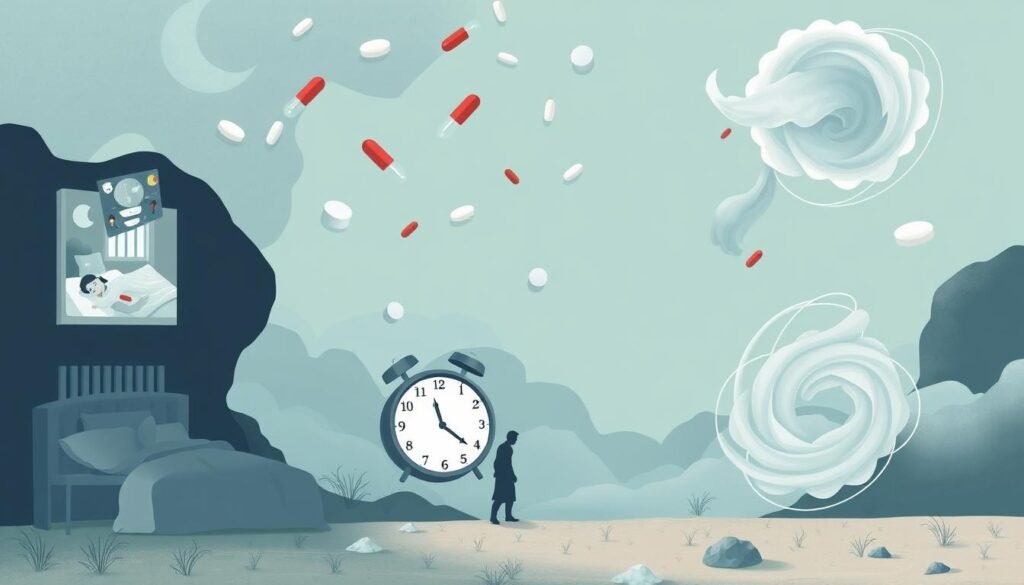Did you know, an amazing 8% of Americans used prescription sleep aids in 2022? People are really looking for ways to conquer their sleep troubles. Figuring out how tramadol impacts sleep is key, since many use it for moderate to severe pain relief. Its use for helping with sleep has raised worries about becoming dependent and messing up sleep routines. This article gives you great tips on tramadol and sleep. It will help you understand how tramadol affects you and how to sleep better tonight.
Key Takeaways
- Tramadol can disrupt natural sleep patterns and lead to insomnia.
- Establishing a consistent sleep routine is vital for better sleep.
- Limiting caffeine intake to mornings can significantly improve sleep quality.
- Utilizing relaxation techniques like journaling can calm the mind before bed.
- Creating a conducive sleep environment can greatly enhance sleep quality.
- Consulting with a healthcare provider about tramadol use is essential for overall wellness.
Understanding Tramadol and Its Effects
Tramadol is a painkiller meant for moderate to severe pain. It is quite effective for those in pain. Knowing how it works and affects sleep is key to using it well.
What is Tramadol?
Tramadol comes in doses from 50-100 mg for short-term pain. For ongoing pain, doses are 100-300 mg daily. Being a controlled substance, it’s crucial to use it under a doctor’s watch due to risks of addiction.
How Tramadol Works
Tramadol changes how the brain feels pain, using a mix of mechanisms. It targets specific brain receptors to reduce pain. However, this can also disrupt sleep.
Tramadol’s Relationship with Sleep
Research shows tramadol may harm sleep quality and length. Long-term use increases sleep problems. Side effects like headaches and anxiety can make sleep worse, posing a problem for those using it to manage pain.
| Dosage Schedule | Type of Release | Duration of Effect |
|---|---|---|
| 50-100 mg | Immediate-Release | 6 hours |
| 100-300 mg | Extended-Release | 12-24 hours |
Talking to doctors about how tramadol affects sleep is important for pain patients. This helps tailor treatment better.
Common Side Effects of Tramadol
Anyone thinking about tramadol should know its side effects. It’s great for managing pain but has downsides. You should know about its physical side effects and sleep issues. It’s also important to understand the risk of becoming dependent on it.
Physical Side Effects
Tramadol’s common physical side effects are:
- Nausea
- Dizziness
- Drowsiness
- Constipation
Using tramadol a lot may cause breathing issues, especially if you have sleep apnea. Taking too much can lead to serious problems, like addiction.
Impact on Sleep Patterns
Tramadol can mess with how you sleep. It often cuts down REM sleep, which helps you feel rested. Not enough REM sleep can cause insomnia and more health issues.
Big doses of tramadol can make sleep worse and reduce sleep quality. Poor sleep can make mood problems worse and increase issues like sleep apnea.
Dependence and Withdrawal Symptoms
Some people may get hooked on tramadol. This leads to tough withdrawal symptoms when they stop. Symptoms like being tired, mood changes, and wanting the drug can greatly impact life.
Insomnia is a big withdrawal symptom, along with stomach problems and sore muscles. It’s very important to detox slowly to ease these symptoms. There are many ways to help with tramadol addiction recovery.

| Side Effect | Description | Potential Impact |
|---|---|---|
| Nausea | Feeling of sickness with an urge to vomit | Discomfort; may impact ability to eat |
| Dizziness | Feeling lightheaded or unsteady | May lead to falls or accidents |
| Drowsiness | Excessive sleepiness | Reduced alertness and performance |
| Dependence | Compulsive use of the medication | Withdrawal symptoms without use |
| Insomnia | Difficulties falling or staying asleep | Increased fatigue and mood disorders |
Tramadol Insomnia Tips: Managing Sleep Disruptions
It can be hard to sleep well when taking tramadol. A steady sleep plan can help lessen the bad effects. By using certain steps, people can get better sleep and feel better overall.
Establish a Sleep Routine
Having a regular sleep schedule can greatly improve sleep. Sleeping and waking up at the same times every day sets a natural balance. These tramadol insomnia tips can help build good sleep habits:
- Set a fixed bedtime and follow it every night.
- Avoid caffeine and big meals before going to bed.
- Have a calming routine before bed to help you unwind.
Track Your Sleep Patterns with a Sleep Diary
A sleep diary is very useful for those on tramadol. It helps you track how well you sleep and find patterns. This record helps you see changes related to tramadol use and make needed changes. You should note down:
| Date | Bedtime | Wake Time | Total Sleep Hours | Sleep Quality (1-10) |
|---|---|---|---|---|
| 01/01/2023 | 10:00 PM | 6:00 AM | 8 hours | 7 |
| 01/02/2023 | 11:00 PM | 6:30 AM | 7.5 hours | 6 |
| 01/03/2023 | 10:00 PM | 7:00 AM | 9 hours | 8 |
Consult Your Healthcare Provider
Seeing a healthcare provider regularly is key for those with sleep problems from tramadol. They can check your situation, suggest changes, or offer other medicines. Getting their advice is a big step towards better sleep.

Optimizing Your Sleep Environment
A good sleep environment is key to better sleep. It means having a comfy place that helps you relax and sleep well. Things like the right mattress and room setup are very important.
Creating a Comfortable Sleep Setting
Finding the right mattress and pillow matters a lot. A good mattress supports your back and helps you sleep better. A supportive pillow for your head and neck adds to your comfort. Other steps to make your sleep space cozy include:
- Keeping the room cool, between 60-67°F.
- Choosing bedding made of breathable materials like cotton or linen.
- Keeping the room tidy to create a calm space.
Minimizing Noise and Lighting
Controlling noise is crucial for undisturbed sleep. Loud sounds can break your sleep. You can use things like:
- White noise machines to hide unwanted noises.
- Soundproof curtains to keep out noise from outside.
Keeping the room dark helps with deep sleep. You can achieve this by:
- Putting up blackout curtains to keep out street lights.
- Covering lights from gadgets to reduce glow in the room.

Setting up your sleeping area for success boosts sleep quality. By managing comfort, noise, and light, you can enjoy more restful nights.
Implementing Sleep Hygiene Practices
Good sleep habits are key for those who have trouble sleeping, especially with tramadol effects. By adopting healthy behaviors, the quality of sleep can greatly improve.
Importance of Consistency in Sleep Schedule
Sticking to a regular sleep schedule is crucial. Going to bed and waking up at the same time every day supports your internal clock. This is really helpful for people dealing with insomnia.
It aids in getting better rest and keeps sleep patterns in check. This leads to a more refreshing night’s sleep.
Avoiding Caffeine and Heavy Meals Before Bed
Caffeine can hurt sleep quality if you have it too close to bedtime. Eating big meals can also make you uncomfortable and disturb your sleep. Cutting down on caffeine is a smart move for sleep hygiene.
It’s best to avoid eating a lot right before bed. This makes for a more peaceful night’s sleep.
Engaging in Relaxation Techniques
Adding relaxation techniques to your bedtime routine can boost sleep hygiene. Try deep breathing, meditation, or gentle yoga to lower stress and get ready for sleep. These activities tell your body it’s time to relax, increasing your chance of good sleep.
| Sleep Hygiene Practice | Description | Benefits |
|---|---|---|
| Establish a sleep routine | Going to bed and waking up at the same time daily | Regulates internal clock, improves sleep quality |
| Avoid caffeine | Limiting caffeine intake, particularly in the afternoon | Reduces sleep disruptions, supports deeper sleep |
| Relaxation techniques | Practices like meditation or deep breathing before bed | Decreases stress levels, initiates sleep readiness |
| Create a calming environment | Dark, quiet, and comfortable sleeping space | Promotes relaxation, enhances sleep quality |
Improving your sleep habits can really help with tramadol-related sleep issues. For more tips on handling sleep problems, visit effective behavioral patterns.
Natural Remedies for Sleep Improvement
Improving sleep quality can be done with natural remedies. These alternatives are great for those avoiding conventional medications or experiencing insomnia from opioid withdrawal. Using herbal supplements and practicing mindfulness can help you sleep better.
Herbal Supplements and Their Effectiveness
Valerian root and chamomile are effective for better sleep. Valerian especially can help you fall asleep faster if used regularly for two weeks. Before using valerian, it’s important to talk to a doctor to avoid negative effects with other medications.
While helpful, valerian can also lead to headaches and dizziness. So, it’s key to watch how it affects you.
Implementation of Breathing Exercises and Meditation
Adding breathing exercises and meditation to your day can help you sleep better. These mindfulness practices clear your mind and lessen anxiety, especially useful during opioid withdrawal. Deep breathing and guided meditation bring calmness, setting the stage for good sleep.
Regular mindfulness practices also boost long-term health and wellness.
Looking into chronic insomnia, lifestyle changes, and sleep hygiene can deepen your sleep knowledge. Visit natural remedies and therapies for insomnia tips during opioid withdrawal and smart lifestyle changes for better sleep habits.
Exploring Cognitive Behavioral Therapy (CBT)
Cognitive Behavioral Therapy for insomnia (CBT-I) helps those with sleep problems. It works on harmful thoughts and actions causing poor sleep. Individuals learn useful strategies for better rest. Studies show CBT-I is more effective than standard treatments.
How CBT Can Help with Insomnia
CBT-I uses different methods to improve sleep. These include regulating bedtime habits, limiting bed use for sleep only, and teaching relaxation. People have seen better sleep time, efficiency, and less wakefulness after starting CBT-I. It also corrects false beliefs about sleep and promotes healthy sleeping habits.
Finding a Professional for CBT
Finding an expert in CBT is key for good results. A trained therapist can customize CBT-I for your specific issues. Tools like journaling and planned activities boost CBT’s positive effects, improving your mental health and sleep.
| Strategy | Description | Expected Outcome |
|---|---|---|
| Stimulus Control | Reassociating the bed with sleep rather than wakefulness | Improved sleep onset and maintenance |
| Sleep Restriction | Limiting time in bed to actual sleep time | Increased sleep efficiency |
| Sleep Hygiene | Practicing good sleep habits, like avoiding screens before bed | Enhanced overall sleep quality |
| Cognitive Restructuring | Identifying negative thought patterns about sleep | Reduced anxiety regarding sleep |
| Relaxation Training | Utilizing techniques to lower stress and promote calm | Easier transition to sleep |
Making Helpful Lifestyle Changes
Making some lifestyle changes can really boost sleep for those dealing with tramadol use. It’s good to focus on moving more and using screens less. Both help make your sleep better overall.
Physical Activity and Its Role in Sleep Quality
Being active regularly can smooth out your sleep patterns. This is super helpful for those who can’t sleep due to tramadol. Walking, swimming, or yoga are great. They not only make you feel good but also help you sleep deeply.
A study proved that exercising helps you fall asleep quicker and improves sleep quality. So, it’s clear that being active is key for better sleep when dealing with lifestyle changes.
Reducing Screen Time Before Bed
It’s also key to cut down on screen time before sleeping. The blue light from devices messes with our sleep cycle. Try not to use screens at least an hour before bed to sleep better. Also, keeping your phone’s brightness low at night can help.
Plan an evening routine with less device use. Try reading or meditating to relax and get ready for sleep. These activities can really help you wind down for the night.
By getting active regularly and cutting screen time, your sleep can get much better. Here’s a resource for more tips on lifestyle changes for improved sleep.
Conclusion
People with insomnia from tramadol can find better sleep in many ways. Learning about how tramadol affects sleep is helpful. They can also create a better sleep space and follow good sleep habits.
It’s key to get help if sleep problems don’t improve. This can make a big difference in dealing with sleep troubles.
Using tips from this article can help someone sleep better if tramadol affects them. It’s good to learn more and get support if tramadol is a problem. You can find more info by checking out the research on tramadol use.
Small changes in how you sleep can make a big difference in how you feel. Knowing about issues with tramadol can help you handle sleep problems well. This knowledge leads to better sleep and health.